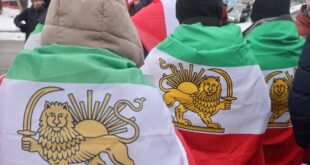 TEHRAN (FNA)- Iraqi Vice President Adel Abdul al-Mahdi conferred on Monday with Iranian Foreign Minister Manouchehr Mottaki on the latest developments in Iraq, including a provocative agreement to be signed by Baghdad and Washington, which secures long-term US presence in Iraq.
TEHRAN (FNA)- Iraqi Vice President Adel Abdul al-Mahdi conferred on Monday with Iranian Foreign Minister Manouchehr Mottaki on the latest developments in Iraq, including a provocative agreement to be signed by Baghdad and Washington, which secures long-term US presence in Iraq.
During the meeting, the two sides explored avenues for broadening economic cooperation and upgrading current level of trade exchange between Tehran and Baghdad.
They also discussed latest developments in Iraq, security pact between Iraq and the US, the need for withdrawal of foreign troops from Iraq as stipulated in the chapter seven of the UN charter as well as educational cooperation mainly for Iraqi diplomats.
Iraqi vice president said earlier that no security deal will be signed with the United States without Iraqi parliament’s approval as well as Iraqi nation’s accord.
“Any security pact to be signed with US must include a final timetable for US troops’ withdrawal. It must also totally serve Iraq’s sovereignty,” Adel Abd al-Mahdi said after meeting with Grand Ayatollah Sistani in the holy city of Najaf.
“Iraqi people will have the last word on any future security deal,” Abd al-Mahdi said.
The Iraqi vice president stressed that all matters related to the presence of foreign troops in Iraq including immunity for foreign forces must be clearly defined and all the military operations must be supervised by Iraqi government.
The US is pushing for a controversial security deal with Iraq that will provide a legal basis for US troops to remain in the oil-rich country after a United Nations mandate expires at the end of this year.
The agreement also gives the occupation forces a free rein to stage military operations wherever and whenever they deem necessary, without consulting the Iraqi government.
Tehran is concerned that the yet-not-concluded security deal could lead to establishment of permanent US bases in the neighboring country.
The proposed pact is also facing widespread opposition among Iraqi politicians.
Many fear Washington has plans to keep permanent bases, despite a denial of any such plan written into the proposal. Iraqis say the drafts submitted by the Americans thus far would infringe on Iraq’s sovereignty by giving US forces too much freedom to operate.
The security pact also faces strong criticism from members of al-Maliki’s own coalition. Two Iraqi officials familiar with the negotiations have warned that a deal is unlikely to be reached before the end of President Bush’s term in January unless Washington backs off some demands seen as giving American forces too much freedom to operate in Iraq and infringing on Iraqi sovereignty.
Iraq’s parliament must approve the deal, and the two officials said opposition in the legislature was so widespread that it stood no chance of winning approval without significant changes in the US position.
 Eurasia Press & News
Eurasia Press & News



